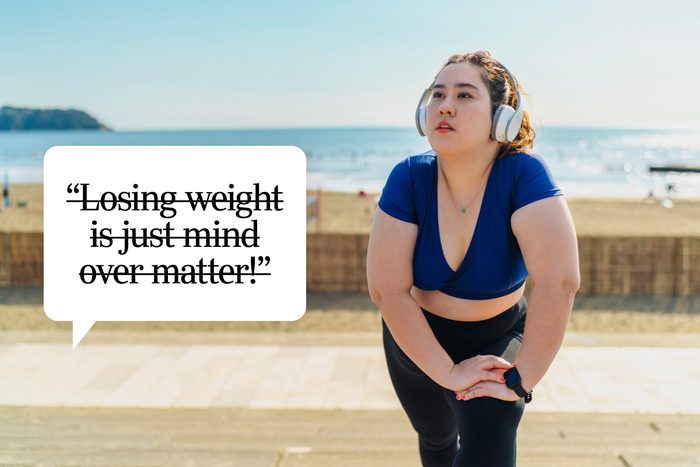
Weight isn’t just a number
Is it the skinny jeans or the skinny genes? When a loved one or acquaintance’s appearance has noticeably changed, you may be tempted to comment on their weight. It’s an understandable urge, but you need to remember that so many things influence that number and how someone feels about it. This makes it extra important to choose your words about weight carefully and follow a few etiquette rules. Even many “polite” comments end up being rude, and chances are, you’ve experienced this yourself at some point.
“My weight is a big topic of conversation in my family. Over the past few years, I’ve given them a lot to talk about, as I’ve lost weight in my fitness journey and gained weight when I got pregnant with twins. How much they think I need to gain or lose, how I do it, when it happens—it’s all on the table,” says Amber Richards, who lives in Denver. “And I know they are saying these things from a place of love and concern for me, but all the comments on my weight make me feel like I’m never good enough. It’s stressful!”
Richards certainly isn’t the only person to get stressed out about weight comments. “Weight is such a sensitive topic to discuss with people because it is connected to self-esteem, body image and overall self-worth,” says Haley Perlus, PhD, a sports and performance psychologist. “Many people experience struggles with weight or accepting their body type, so it is crucial to approach all conversations about weight with empathy and sensitivity.”
Should you avoid conversations about weight altogether?
No. Even though these conversations can be tricky, they can still be important to have. After all, our bodies are a big part of who we are, and so much of how we relate to and spend time with others revolves around eating, drinking, exercising and other physical activities—all of which are intertwined with weight.
Knowing the proper etiquette for speaking about weight is important to maintaining healthy relationships, just like it is for talking about aging and mental health. And we have the specifics on what you shouldn’t and shouldn’t say—to people of all weights, shapes and sizes—so you can avoid some common etiquette mistakes and actually make the people in your life feel good about themselves.
Get Reader’s Digest’s Read Up newsletter for more etiquette tips, humor, cleaning, travel, tech and fun facts all week long.
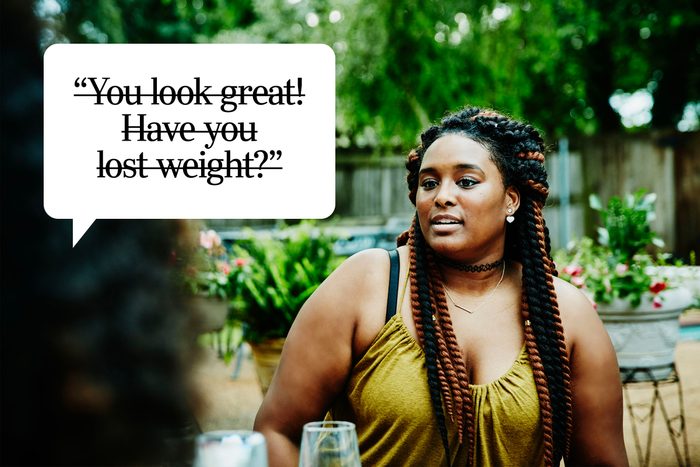
Saying weight loss makes someone more attractive
Weight loss takes hard work and is often very noticeable, so it makes sense that you’d want to commend someone on shedding a few pounds. Unfortunately, this common compliment is based on the assumption that weight loss is always desirable for looking “great,” and it can also imply that the person didn’t look great before, Perlus says. Plus, there might be other factors behind a person’s weight loss, from illness to stress.
“I recently went through an intense breakup and lost a lot of weight because I was on the ‘grief diet,'” says Lea Miller of San Francisco. “I was at a healthy weight before, but now people are telling me how great I look this thin, and now I worry that they’ll think I’m unattractive if I gain any weight back. It’s such a toxic and unhealthy mindset.”
Say this instead: “You look fantastic! How have you been feeling lately?” What you really want to acknowledge is that the person is looking well, and you can say that without commenting on their weight whatsoever, Perlus says. If they bring up their weight loss, then that shows they are open to talking about it; in that case, feel free to compliment them or ask questions, she says. Just let them be the one to bring it up first. Make a mistake? Don’t beat yourself up for it—here’s how to apologize.
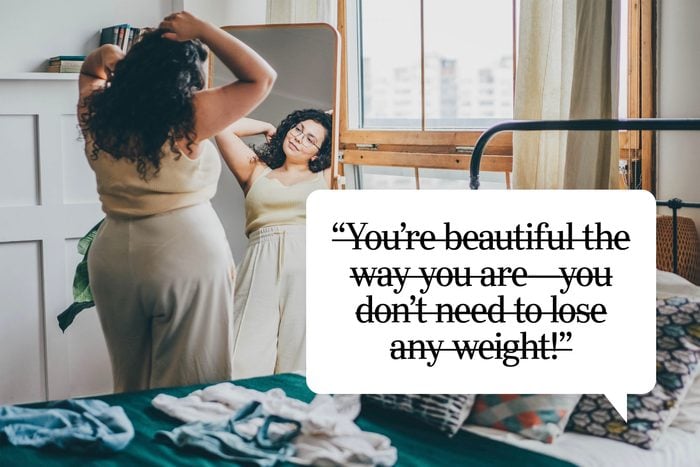
Saying you don’t think they need to lose weight
After having her babies, Richards wanted to compete in a bikini competition as a way to reclaim her body for herself. During her training, she heard this phrase a lot, and while her family wasn’t wrong—she knew she was beautiful regardless of the number on the scale—their comments invalidated her control over her own body. “I wasn’t losing weight to lose weight,” she says. “Doing this competition was a longtime goal of mine, and the weight loss was a means to achieving that.”
Ultimately a person’s weight is their business and only their business, and their motivation for gaining or losing weight isn’t something they’re required to share, Perlus says. Sometimes, however, this comment comes out of a concern that the person may be doing something unhealthy. If you think your loved one might have an eating disorder, talk to a professional about the best way to approach them.
Say this instead: “I care about you, and I’m concerned about some of your recent eating changes. Can we talk about it?” The key is to lead with kindness and empathy, not negativity, Perlus says.
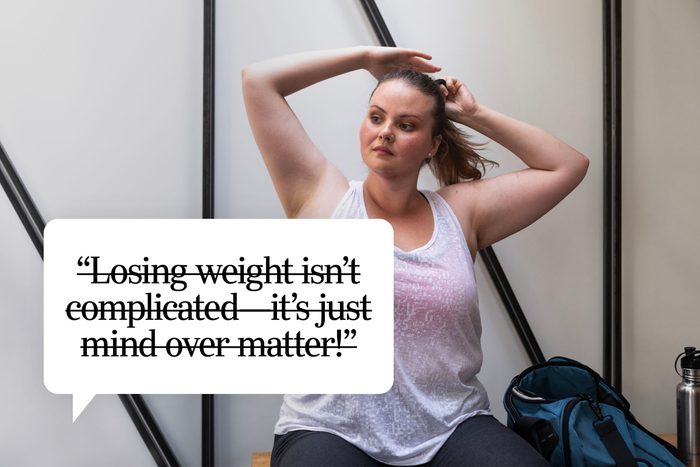
Oversimplifying weight loss
A very common myth about weight is that it’s entirely within our control and that if someone just tries hard enough, they can be whatever weight they want. People might say to “just walk away from the table,” “just drink a glass of water instead of eating chips” or “just exercise more.” You may just want to make weight loss feel doable, but oversimplifying it can make the person you’re talking to feel like a failure. Comments like this can also have the opposite effect of what you intend if they make the person feel shame, says Ellen Alberston, PhD, RDN, a dietitian and therapist who has researched body image and weight shaming. “When someone feels embarrassed or ashamed of their body,” she explains, “they are less likely to exercise and eat mindfully.” Plus, they’ve most likely heard this advice already!
“I actually have a lot of willpower, and I know I can do hard things because I’ve done a lot of them in my life,” says Aaron Peterson of Fort Worth, Texas. “But I’m over 300 pounds, and I got that way from my choices but also from my genetics, the ways I was raised, my environment and my feelings about food. If it was just about willpower, I’d be at my goal weight. But it isn’t. Obesity is a disease.”
Say this instead: “I hear you saying you’re really frustrated. How can I support you in your health goals?” However, you should say this only if they broach the topic and share their frustrations. When that happens, be empathetic and offer your support—but skip the platitudes, and leave the generalized diet and nutrition advice to the pros.

Offering unsolicited diet advice
Let’s be honest: Any unsolicited advice is annoying. But health advice may be some of the most irritating advice to receive, especially when you don’t know someone’s personal health history or goals. “Everyone’s body is different,” says Perlus. “What worked for one person may not work for another.”
Peterson knows this conversation all too well. “As a guy of my size, I get a lot of unprompted diet advice, and if I had a dollar for every person who has told me to try the ketogenic diet, I’d be rich,” he says. “I appreciate the tips and the concern, but I have sky-high cholesterol, and my doctor says keto would be really bad for me.”
The bottom line? Unless someone specifically asks for your advice, your “helpful” suggestions about specific diets or exercise routines are actually unhelpful.
Say this instead: “If you ever have any questions about my weight journey, feel free to ask! But I won’t bring it up unless you do.” People who have lost weight often want to share what worked for them, and that’s not a bad instinct. In fact, sharing healthy-living tips with loved ones is a way to show you care—as long as it’s something they ask to hear. Never offer unsolicited health advice of any kind, Perlus says.

Telling someone to not worry about what they eat
What’s the harm in offering your favorite food and sharing something you love? There’s no need for anyone to feel guilty for indulging in one little thing—it’s not a big deal. But it can be, and the technical term for what you’re doing is “food pushing.” It can be undermining, Perlus says, and it likely isn’t going to work the way you want it to, instead making the other person feel defensive of their eating choices.
“My family owns a Mexican restaurant, and our food is an important part of our culture and how we show love. But I’m vegan, so I don’t eat any dishes with animal products in them,” Richards says. “I’m constantly getting told to ‘just try one bite’ or that I can let loose because eating one dessert isn’t going to make me fat. They assume my diet is solely for weight loss, but I choose to eat this way for both moral and health reasons.”
Say this instead: “I noticed that you aren’t eating the way you used to, and I’m curious about the change. Can you tell me more about your new way of eating?” Instead of assuming someone’s reasons for turning down a food, ask about it.

“Playfully” reminding someone to stop eating
Support is essential when it comes to changing your habits and sticking to a diet, but you need to provide the right type of support. Drawing attention to someone’s food choices isn’t the way to go—even if you think of it as a sign of your closeness. “It’s not uncommon for my mom or aunts to playfully pat my belly, pinch my stomach or loudly clear their throat as a way of telling me I shouldn’t be eating,” says Miranda Martinez, who lives in Miami. She says they see it as a playful reminder to watch what she eats, but she sees it as a reminder that her body and weight are always under scrutiny. Rather than inspiring, she finds it embarrassing and uncomfortable.
Plus, physically touching someone in a way that calls attention to things they may be self-conscious about—like their tummy or their weight—is never a good idea, says Perlus. And it can lead to a feeling of self-loathing or even self-harming behaviors if the person starts to see their body as the enemy. Albertson agrees: “So-called ‘motivating’ comments about weight can increase stress, and this can cause people to either ‘eat their feelings’ and overeat, or lose their appetite due to the stress—neither of which is healthy.”
Do this instead: Physical affection is a powerful way to show love (with permission, of course). A hug, a loving pat on the back, holding someone’s hand or brushing their hair can all show support instead of judgment.
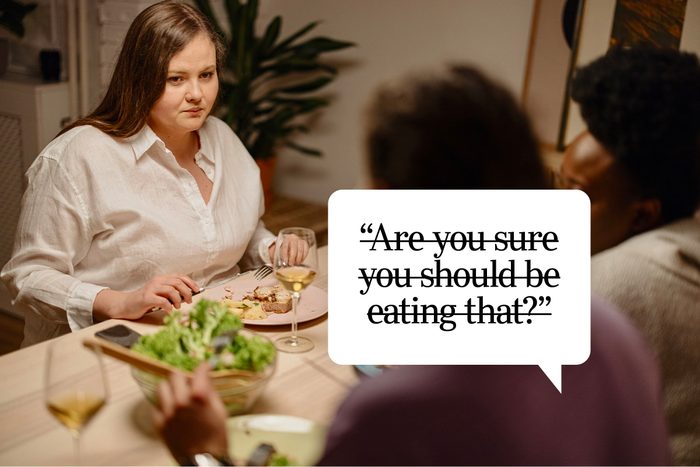
Questioning their food choices
This is another variation of the “polite” comment above, but it’s cloaked in “help.” Yes, you want to help your loved ones achieve their goals … but they may not want that type of help. “The second I told my family that I was trying to lose weight, my sister became the diet police, and it almost ruined my relationship with her,” Martinez says. “I found her constant comments humiliating, but when I confronted her, she said it was for my own good and she was just trying to help.”
“Even well-intended comments can come across as judgmental and intrusive,” Perlus says. “They assume the person’s eating habits are anyone else’s business and can create an uncomfortable atmosphere around food and eating.”
Say this instead: “You’re doing great, and I’m so proud of you! Is there anything specific you’d like me to do to be more supportive of your new lifestyle?” Some people do like others to help keep them accountable to their diet, but you should ask first and offer comments only after you’ve established that is what they want, Martinez says. Here are some body-positive quotes that may help you too.

Calling out their “skinny” genes
Just because someone appears thin, it doesn’t mean that they don’t struggle with their weight or body image. And if they have an eating disorder, these types of comments can add fuel to the fire. “I have a type of bulimia where I overexercise to get rid of calories. I also rarely eat unless I’m with other people,” Miller says. “It isn’t healthy at all, I have a really unhealthy relationship with food, and I know that. But all other people see is that I’m thin and I eat a lot of restaurant food. They think I’m just naturally this way, but they don’t see everything else happening in the background.”
This comment perpetuates the idea that thinness is purely a matter of luck or genetics, disregarding the complex factors contributing to a person’s weight and body composition, Perlus says. And even if the person doesn’t have an eating disorder, they may be self-conscious of their size or weight, and these comments can come across as more catty or envious than complimentary. One unintended side effect? It highlights your insecurities with your body.
Say this instead: “I think you’re beautiful inside and out, and those earrings are amazing.” (Of course adjust that based on what the person is wearing!) This is one instance where you simply shouldn’t say anything at all about their weight or appearance, Perlus says. This comment isn’t a compliment, so find something else you like about them to highlight. If you are concerned about an eating disorder, approach them carefully, with an intent to listen, not judge.
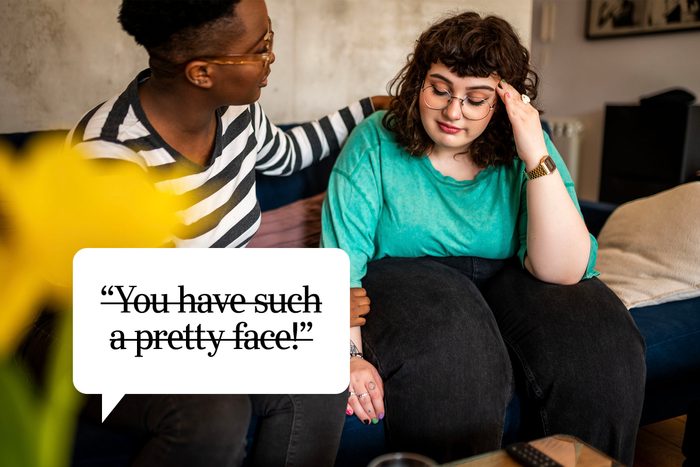
Noting how attractive one feature is
“This is the standard ‘fat girl compliment,’ and it feels like an insult or a joke because it’s such a stereotype, especially in online dating,” says Martinez. “It’s like you’re saying that nothing else about me is pretty.” This compliment can also include an unspoken afterthought of: “If you lost weight, then all of you would be really pretty and not just your face,” she adds. “It hurts to think that I have the potential to be pretty, but I’m not there yet, and that’s because of my weight.”
Beauty is about so much more than the number on the scale, and you should avoid anything that implies a person’s beauty and worth is tied to their weight, Perlus says.
Say this instead: “You are special to me, and there are so many things I love about you and find beautiful.” Focus on your relationship with and love for the other person. This is also good advice when attempting to find the perfect thing to say in many other situations.

Saying how much better they look now
“Thinner is prettier” is such an ingrained beauty standard in our society that it’s often a knee-jerk reaction to tell someone that their weight loss makes them look better. “While the intention behind this comment may be to compliment someone’s appearance, it just reinforces this belief that thin is better,” Perlus says. And it comes with a yucky bonus of: “You didn’t look good before.”
“I have lost about 30 pounds so far, and people will tell me how much better I look, I think as a way to motivate me to keep going,” says Peterson. “And I’ll admit it, it feels good to hear, but there’s also that voice in the back of my head that wonders if they’ll think I look worse if I do gain weight back—and if they think I’m ugly now because I haven’t lost all the weight yet.”
Say this instead: “You look so happy and healthy lately. What’s your secret?” This acknowledges that you can see positive changes in them and gives the person the opportunity to tell you about their lifestyle changes if they wish.
Remember: “No one likes to think that they are being talked about, especially about their weight,” says Albertson. “When you comment on their weight, even in a way you think is helpful, you’re confirming that fear. People who perceive that people are scrutinizing their weight are more likely to report a poorer overall quality of life and lower levels of well-being.”
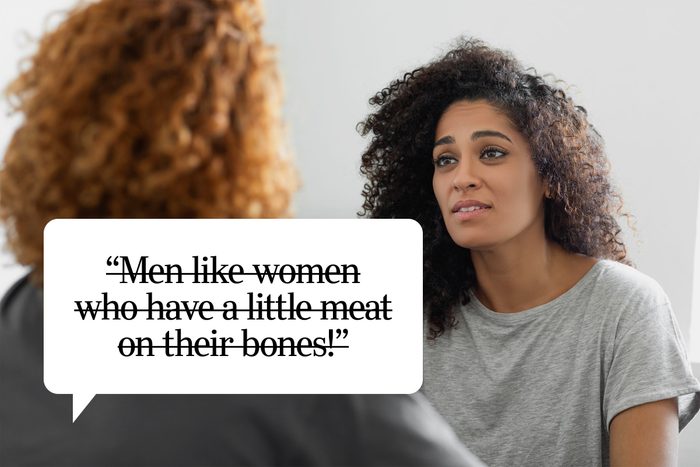
Joking about thin people
While not the most “polite” comment, this sentiment is very common on the internet. It is often used as a rallying cry for body positivity and is seen as encouraging to larger-bodied women, telling them that men actually prefer their body type. Unfortunately this meme is hugely problematic, Perlus says. First, it’s insulting to thinner women—putting others’ bodies down is never a good way to build up your own self-esteem. It also encourages pointless comparisons, assumes everyone wants male attention and that all men have the same preferences, and emphasizes heteronormative beauty standards and relationships.
“I hear this one a lot, and it’s usually in like a ‘you go, girl, eff the haters’ way,” Martinez says. “But it denies the reality of what I’m living. It’s that kind of thing that kept me trapped in an unhealthy lifestyle and an unhealthy relationship for way too long.”
Say this instead: “What’s your favorite thing about your body? What makes you feel really beautiful?” Skip any jokes about weight (fat or thin), and avoid saying anything that denigrates other groups of people.
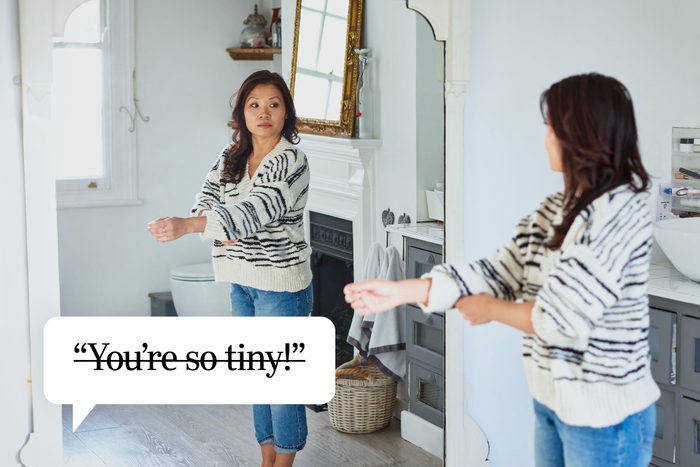
Commenting on how small someone is
People who would never comment on someone being overweight will still feel comfortable commenting on someone being smaller or underweight—and those comments can be just as hurtful. “It feels good when people say this to me, but it’s bad at the same time because it means they notice how small I’ve gotten and it proves the eating-disorder voices in my head right,” says Miller. “Especially because this is usually said with a sense of admiration or envy. This type of comment is one of those things that’s kept me trapped in my disordered thinking.”
You never know why someone is the size they are, and both mental and physical illnesses can cause people to gain or lose weight in an unhealthy way or a way that is out of their control. Pointing it out is not helpful and can reinforce negative thinking and self-image. “Respecting individual choices and promoting body positivity rather than focusing solely on weight is important,” Perlus says.
Say this instead: “You’re doing great things, and I admire your accomplishments. How are you feeling about yourself these days?” Take the focus off their body and weight, and instead compliment something they’ve done.
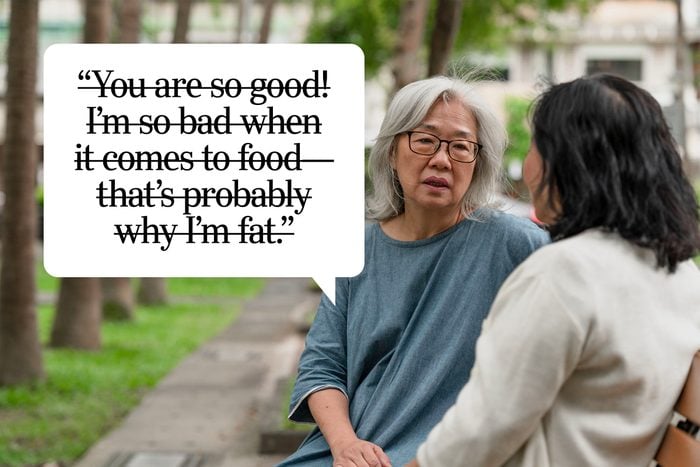
Making food about morality
You may think you’re complimenting their self-control, but food isn’t a moral choice, and a certain weight doesn’t make someone “good” or “bad.” If you have an uncomfortable relationship with your own weight, you may be tempted to put your feelings onto others—and it often shows up in black-and-white statements like this, Perlus says. You may feel that if someone else is making different health choices than you are (“being good”), then it means they are judging you for your choices (“being bad”) and weight.
People aren’t bad or good. Food isn’t bad or good. And weight isn’t bad or good. Seeing food and bodies in a moralistic way is damaging, not just to the person hearing it but to the person speaking it, Perlus explains.
“I grew up always hearing my mom talk about this or that food being ‘bad’ or saying she was ‘so bad’ after eating dessert. Or sometimes she’d say she was so ‘good’ sticking to her diet. Food and weight were never neutral,” Martinez says. “And this really messed me up as a kid. My mom passed down all these issues to me.”
Say this instead: “I really admire how hard you work to take care of your health.” Avoid comparing yourself to others, especially when it comes to your weight and theirs.

Saying that choosing not to eat something is deprivation
Food is often used as a language of love, and when you turn down food, it can feel like a personal rejection. Food can also play a big part in bonding, happiness, celebration and commiseration. This may make your loved one feel like they need to overcome your “no” as a way of showing love and concern for you.
“I meet with a professional nutritionist to help me manage my diet, and one of the things she focuses on is looking at these healthy habits as positives. If I feel deprived, then these habits won’t stick,” says Peterson. “It does not help when my wife tells me to stop depriving myself. She also struggles with her weight, and food is how we used to bond, so I get it. When I say I don’t want to get our favorite fish and chips, it’s like she hears ‘I don’t love you anymore.'”
Say this instead: “I love you, and I want you to be happy and healthy. How can I best support you in your health goals?” Try your best not to take a rejection of food as a personal rejection, adds Perlus.
About the experts
- Haley Perlus, PhD, is a sports and performance psychologist. A former competitive downhill skier, she now works as a performance coach and serves as an adjunct professor at the University of Colorado.
-
Ellen Alberston, PhD, RDN, has worked as a dietitian and therapist in private practice for nearly 30 years. She is also a teacher and researcher, publishing studies on body image, weight shaming and self-compassion in health.
